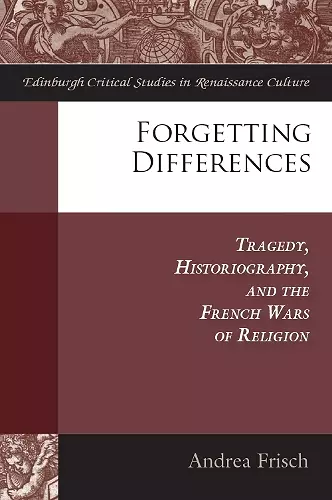Forgetting Differences
Tragedy, Historiography, and the French Wars of Religion
Format:Hardback
Publisher:Edinburgh University Press
Published:2nd Jun '15
Currently unavailable, and unfortunately no date known when it will be back

Examines the impact of the royal politics of amnesia on tragedy and national historiography in France, 1560-1630 This study argues that the political and legislative process of forgetting internal differences, undertaken in France after the civil wars of the sixteenth century, leads to subtle yet fundamental shifts in the broader conception of the relationship between readers or spectators on the one hand, and the matter of history, on the other. These shifts, occasioned by the desire for communal reconciliation and generally associated with an increasingly modern sensibility, will nonetheless prove useful to the ideologies of cultural and political absolutism. By juxtaposing representations of the French civil war past as they appear (and frequently overlap) in historiography and tragedy from 1550-1630, Andrea Frisch tracks changes in the ways in which history and tragedy sought to 'move' readers throughout the period of the wars and in their wake. The book shows that a shift from a politically (and martially) active reading of the past to a primarily affective one follows the imperative, so clear and urgent at the turn of the seventeenth century, to put an end to violent conflict. The emotions that neoclassical tragedy and absolutist historiography sought to elicit were intended above all to be shared, and thus a medium via which political and religious differences could be downplayed or forgotten. The book aims to illuminate some of the ways in which the experience of the wars of religion, as registered in tragedy and historiography, contributed to a restructuring of the ever-vital relationship between emotion and politics, and thereby to historicize the very concept of 'esmouvoir'. Key Features Confronts historiography and tragedy in the era of the French Wars of Religion Addresses the themes of amnesty, pardon, memory, and forgetting in the context of civil war Provides both close readings and a broad argument about the impact of the monarchical politics of reconciliation on conceptions of how history and tragedy should 'move' their audiences Treats multiple French authors including André de Nesmond; Henri-Lancelot Voisin de la Popelinière; Pierre Matthieu; Jean de la Taille; Robert Garnier Andrea Frisch is Associate Professor of French and Comparative Literature at the University of Maryland. Keywords French Wars of Religion; Saint Bartholomew's Day massacres; Edict of Nantes; tragedy; historiography; emotion; reconciliation; Henri IV (Henri de Navarre); Robert Garnier; Pierre Matthieu Subject: Literature
This is a brilliant and provocative book, upending a good deal of received wisdom concerning the roots of French neoclassicism, the history of tragedy and the emergence of modern historiography. Combining deep historical scholarship with enviable hermeneutic flair, it not only enlivens debates about the historical trajectory and character of early modern French literary and intellectual culture but also opens new avenues for discussion in future. * Christopher Braider, Professor of French and Comparative Literature, University of Colorado Boulder *
...an exciting and very welcome addition to studies on French historiography and theatrical tragedy. -- Michael Meere, Wesleyan University * French Studies, vol 70, no 4 *
It is hard to do justice to the richness of her argument through summary...the book fields an extended, subtle, and ultimately powerful argument that demands we rethink the connection between a number of cultural fields usually segregated. -- George Hoffmann, University of Michigan * Modern Philology, Vol 113, No 4 *
…this extremely well-researched and argued study shows how "a program to promote national unity and reconciliation" gave rise to a poetics that moved tragedy far from current events in order to "buttress the authority of the monarch and divert attention from political troubles". -- Marc Bizer, University of Texas at Austin * Renaissance Quarterly 70:4 *
Very few works can accommodate so many ideas and analyses and still be a page-turner like Frisch’s book. This is a beautiful, seminal, crucial work, which scholars of the French Renaissance must consult. -- Charles-Louis Morand-Métivier, University of Vermont * The Sixteenth Century Journal Volume XLVII: 3 (2016) *
This is a beautiful, seminal, crucial work, which scholars of the French Renaissance must consult. -- Charles-Louis Morand-Metivier, University of Vermont * The Sixteenth Century Journal, Vol 47, No 3 *
This book is masterfully written. Very few works can accommodate so many ideas and analyses and still be a page-turner like Frisch’s book. This is a beautiful, seminal, crucial work, which scholars of the French Renaissance must consult. -- Charles-Louis Morand-Méivier * The Sixteenth Century Journal, Vol. CLV11, no. 3, Fall 2016 *
ISBN: 9780748694396
Dimensions: unknown
Weight: unknown
192 pages